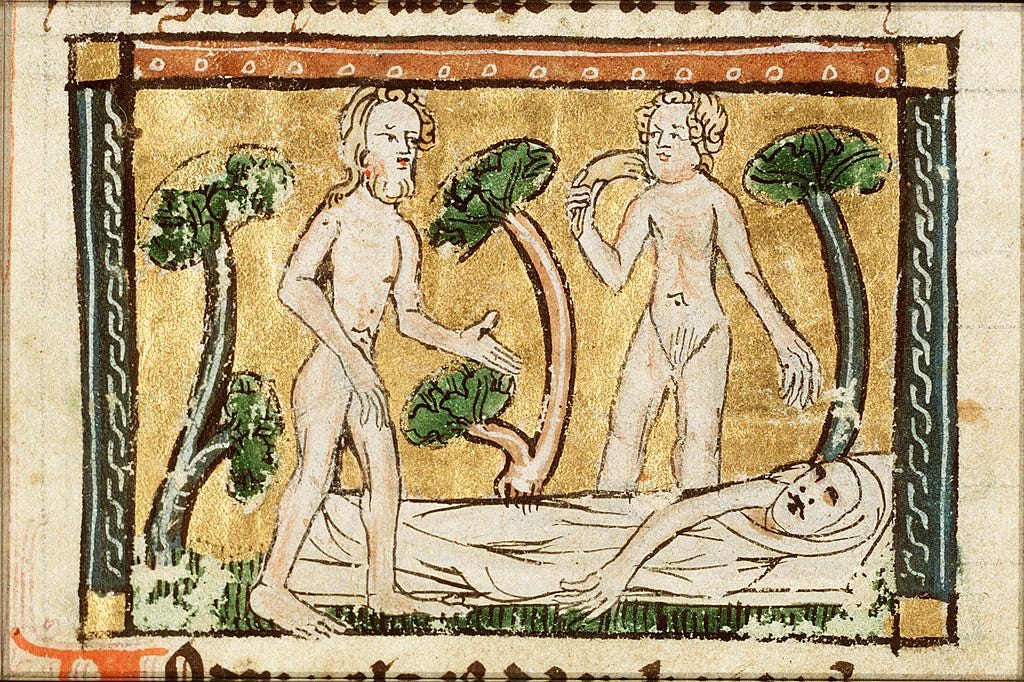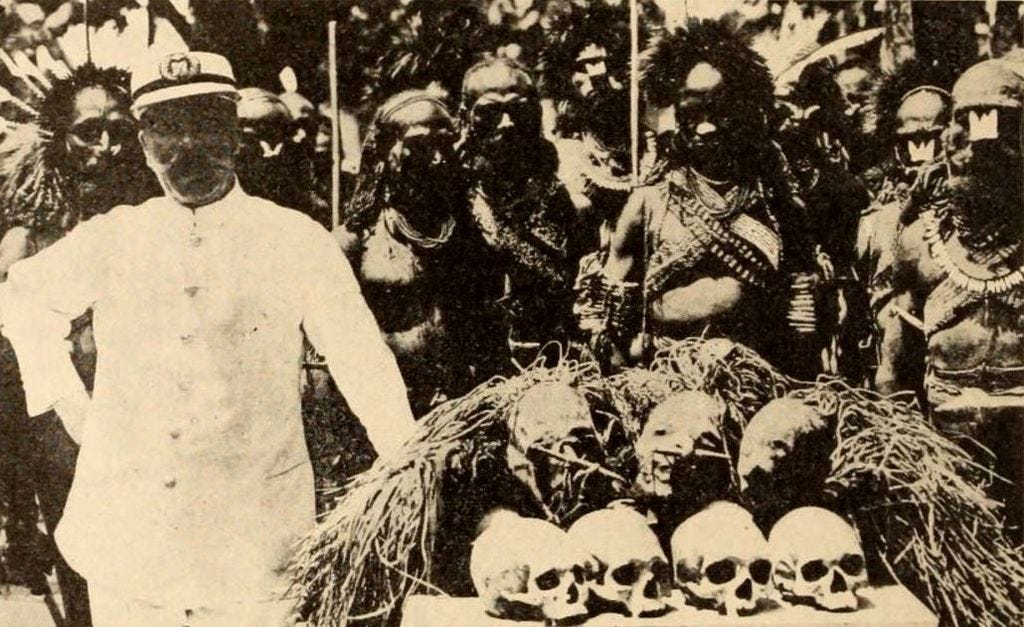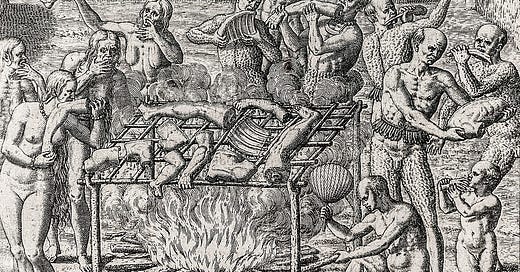The third season of Yellowjackets—after a long two year wait for most, and short few months for my family who only just discovered this great, gross show recently—released this week on Valentine’s Day. For, as a reporter on NPR said,
“Nothing says love like cannibalism.”
I also heard on this same Morning Edition segment a reference to the show as Lord of the Flies, but with women, and an actor enticing us with the possibility that you might both “cry and throw up at the same time.”
When I get a bee in my bonnet—or in my case, a yellowjacket…
I guess you could say watching too much of this show in a row (after writing way too often of late about various iterations of meat from hotdogs to fangy weremoms) has gotten to my head a little. I was listening to a podcast—often just employed for the Aussie accent of the narrator to lull me off to sleep—talking this time on various green flags signaling healthy romance, one of which the host said was “accountable.” What did I hear as I began to doze off? “a-cannibal.” When a green flag becomes a consumer of human flesh, it’s time of course to investigate this in an essay topic. And apologies for my warped bent of late; someday I will recover and get someplace less precarious. Maybe when we are standing on more solid ground.
But for now, planes are falling out of the sky more often than we’d like, so I hope you won’t find it in bad taste to talk about a historic crash that inspired the show and, yes, led to some unsavory survival eating in real life. And then we have to talk about the crash and the bad behavior (if not actual cannibalism) of the classic boys-gone-wild saga, William Golding’s Lord of the Flies.
FLIGHT 571
From one of a handful of New York Post articles from 2022 on the connections between the show and its true predecessor of 1972,
Showtime‘s Emmy-nominated hit “Yellowjackets” tells the story of a team of high school soccer players who survive a harrowing plane crash and must fend for themselves in the wilderness.
Fernando Parrado, 72, can relate.
Nearly 50 years ago, he and his rugby teammates were on the ill-fated Uruguayan Air Force Flight 571. The plane was carrying 45 passengers when it crashed into the Andes Mountains. 12 died instantly.
The remaining people fought for survival for months, stranded in the snow. By the time they were rescued after 72 days, only 16 men were alive.
“Some create their own histories.”
Parrado wrote a book about those awful months, Miracle in the Andes: The True Story of Surviving 72 Days on the Mountain Against All Odds. It also might sound eerily familiar if you’ve watched Yellowjackets season 1 and 2 so far. I assume I don’t have to announce “spoiler alert” here since you know the topic; also, good news, the meat doesn’t “spoil” in the Andes because it’s conveniently frozen.
As people died off and supplies waned, the extreme cold preserved the corpses, and talk among the starving survivors turned to edibles.
Unlike “Yellowjackets,” which dances around the potential cannibalism, Parrado doesn’t shy away from the topic.
“Life is very simple sometimes,” he said. “Hunger is the most primal fear of human beings.”
As soon as the 10th day, the men (or in many cases teens and 20-somethings) started discussing eating the deceased, which if memory serves me right took quite a bit longer (about two months) and gets way uglier in Yellowjackets, when there’s also a risk of being hunted like prey when you are still quite alive. Is it possible to say the men behave better? They make pacts to donate their bodies to the others should they pass. They seemed to understand there was no guilt in this, and again, unlike the surviving women who are destroyed by secrets and shame when they reemerge, make no beef about hiding the truth. Apparently when they did get some guff, they invoked the ol’ WWJD, saying they were inspired by the Last Supper to appease Catholics (who eat “the body of Christ, given and shed for you” all the time).
The team’s story was also depicted in the bestseller of 1974, Alive by Piers Paul Read, which was later adapted into the film of the same name in 1993, starring Ethan Hawke and Josh Hamilton.
“Yellowjackets” co-creator Ashley Lyle has said that the movie and story behind it were “absolutely” inspiring to her, but she wondered how things would have played out differently if it had been a plane full of female athletes who crashed into the Andes.
“I was like, that will get very dark, but in a very different way,” she told NPR. “So it felt like a new story to be told.”

LORD OF THE FLIES
If you were expecting cannibalism from this tale, I can only offer you savagery and violence. In the 1954 novel Lord of the Flies, predating the Andes plane crash by 18 years (and stirring several subsequent movies), a group of young boys (ranging from 6 to 12), are stranded on an uninhabited island after a plane crash. Major difference here is setting: the survivors don’t have to resort to eating each other since they are in a warmer place abundant with vegetation. This coming of age story for many of us who read it in high school can be more of an unbecoming. The boys unravel cultural norms enough to murder two of their own, as boys do, though I assume when they are British like this that is considered decidedly impolite.
I’ve talked about world-building in recent weeks (and related: world-burning); it is fascinating to me in these real and imagined tales to witness how in these extreme moments when all known constructs are wiped away in an instant, the mechanisms of society soon reorganize. There are sub-groups, hierarchies, alliances, and enemies that form in Yellowjackets, whereas the men seemed pretty tight and healthily communicative in the Andes. On this island, we are talking about really immature kids and preteens forced to figure this out. Sometimes they just wander off to play and things go wrong fast. From this Sparknotes summary, when the boys aren’t monitoring a fire they make, it grows out of control and ravages the forest, likely burning to death one of their missing friends. They are distracted by having fun at first in this weird new world free of adults, until some who have risen up as leaders demand more work and attention.
When a ship passes by on the horizon one day, Ralph and Piggy notice, to their horror, that the signal fire—which had been the hunters’ responsibility to maintain—has burned out. Furious, Ralph accosts Jack, but the hunter has just returned with his first kill, and all the hunters seem gripped with a strange frenzy, reenacting the chase in a kind of wild dance. Piggy criticizes Jack, who hits Piggy across the face. Ralph blows the conch shell and reprimands the boys in a speech intended to restore order. At the meeting, it quickly becomes clear that some of the boys have started to become afraid. The littlest boys, known as “littluns,” have been troubled by nightmares from the beginning, and more and more boys now believe that there is some sort of beast or monster lurking on the island. The older boys try to convince the others at the meeting to think rationally, asking where such a monster could possibly hide during the daytime. One of the littluns suggests that it hides in the sea—a proposition that terrifies the entire group.
While there’s that indelible image of the animal head placed on a stake, I guess we can feel relieved it’s at least not human. We see in these scenes, haunted by nightmares and monsters (and a vision that the fly-covered pig head is speaking), great similarities with the supernatural subthreads of Yellowjackets. The way fact and fiction intertwine quickly in a land of horror and hunger.

TASTES LIKE CHICKEN?
Leave it to Reddit to answer the question on everyone’s lips, should you be so darkly curious as I and all the others gathered in this “Writers” forum. None other than the species known as Writer dares to ask:
What does human flesh taste like? I pinky swear it’s for a book.
just a general flavor or a different food to compare it to would be great!
To which they get the following:
For writing purposes, you could just ref whats been documented online. Plenty of sources say it’s like a bitter pork. The flavour changes depending on the age, part, and lifestyle of the person.
I did read recently that uncooked flesh is unpleasant to bite into with human teeth, which left me feeling weird.
In the end, human flesh is not an alien flavour. It’s one we’d likely enjoy, but our conscience changes our experience.
No one says chicken; the consensus seems to be: pork. “There’s a reason human meat is sometimes called Long Pig,” says one. Another says, sweeter pork rather bitter. Those who have smelled burnt flesh say it smells like BBQ pork. “My brother briefly worked in a morgue, and I remember one day when a pork roast was cooking he had to get out and go for a walk because they’d had someone who died in a fire that week and the smell was too similar.”
No one admits to trying it themselves. I guess you’ll have to consult those honest Flight 571 survivors. In another NY Post post from the 50th anniversary, Ramon Sabella, age 70 in 2022 recalled,
“Of course, the idea of eating human flesh was terrible, repugnant… It was hard to put in your mouth. But we got used to it. In a sense, our friends were some of the first organ donors in the world—they helped to nourish us and kept us alive.”
Perhaps in the same way that I will happily donate my body to science should my soul find itself separating from my flesh in a hospital sort of setting, I will also willingly invite my fellow travelers to partake of my “long pig” should I happen to croak in the wild. Help yourself, have at it. My last, most generous, gesture.
[Appreciate what I produce here but don’t feel like committing to a paid subscription? Spare some change to Buy Me a Book.]






Long pork - it's what's for dinner! Have you seen the Monty Python cannibalism sketch? It's pretty much like those Andes guys - they're all pretty generous and good natured.
https://www.youtube.com/watch?v=8sljSf7KVlQ
I think I could eat a human if it was decently prepared (and of course, necessary for my survival, and already dead [if freshly]). But then again I've eaten squirrel and rattlesnake and wild boar. Meat's meat, right?
I found this piece especially uplifting and amusing, I guess because I'm in a dark period too (no surprise). I think this is a way to match and burn off the cultural devil who is currently ascendant. Fire meets fire.
I still can’t watch this show! But Arlo loves it :)